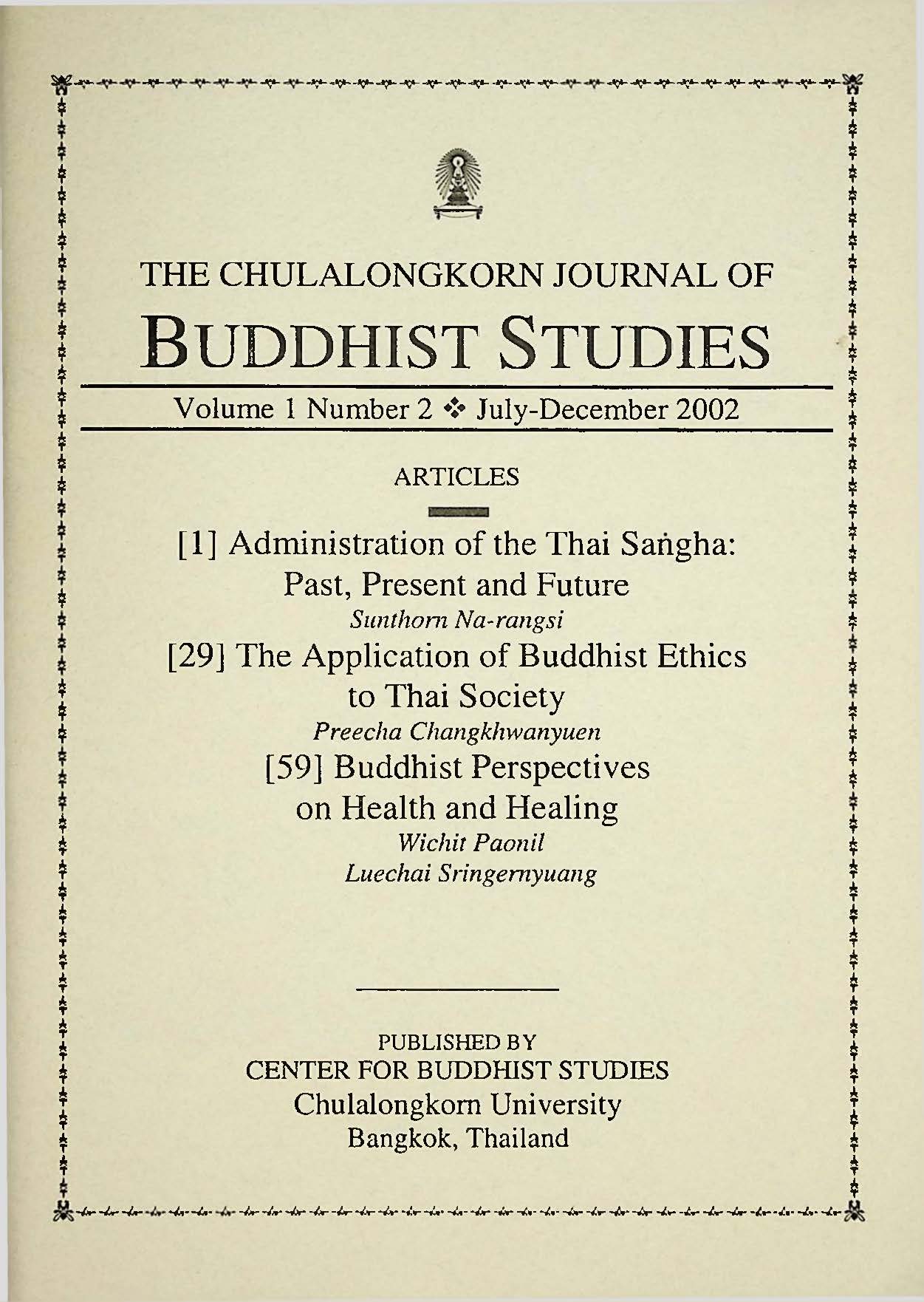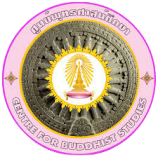BUDDHIST PERSPECTIVES ON HEALTH AND HEALING
Keywords:
Buddhist, Buddhism, health, healing, illness, sickness, paradigmAbstract
This study was begun because of the recognition of the problems in health systems we are presently facing. Those health problems are not only due to the deficiency in scientific and administrative knowledge, but are also the result of the limitation of the paradigm that we currently use to generate the knowledge and the ways to solve health as well as other global problems. The objective of this study is to find an alternative paradigm for understanding health issues by investigating the Buddhist canons. The Thai Tipitaka on CD-ROM was used as the basic database for gathering Buddhist principles and perspectives on health and healing. Buddhism looks at all existences in term of integrated factors depending on processes of inter-dependent causal relationships governed by the Three Characteristics (tilakkhana) or the Dependent Origination (paticcasamuppada'). This premise deeply guides the disciples’ perceptions and living styles. The broadest meaning of disease in Buddhism involves all kinds of human sufferings, while health is the state of being completely free from all suffering. Health quality is a collective product of previous actions starting from past lives and ending at your last second. While suitable care is given to a patient, he/she should realize the nature of this so fragile, no-self life. These principles will lead patients and their relatives to have less suffering and anxiety. It will be, moreover, a basic belief of a health system that concerns more with the spiritual aspect of life.
References
Bhikkhu P. A. Payutto. (1993). (Bhikkhu Puriso, translator).Good, evil and beyond: Kamma in the Buddha’s teaching. Bangkok: Buddhadhamma Foundation.
Bhikkhu Nanamoll. (translator) (1972). The Girimananda sutta. Ten contemplations. In Selected Buddhist texts from the Pali Canon vol. III. Kandy (Sri Lanka): Buddhist Publication Society, pp. 1-44.
Chai Podhisita. (1985). Buddhism and Thai world view. In Traditional and changing Thai worldview. Bangkok: Chulalongkorn University Social Research Institute, p. 25-53.
Homer, I.B. (translator) (1982). The book of the Discipline (Vinaya-Pitaka) vol. II (Suttavibhariga). London: The Pali Text Society.
Homer, I.B. (translator) (1983). The book of the Discipline (Vinaya-Pitaka) vol. III (Suttavibhahga). London: The Pali Text Society.
Homer, I. B. (translator) (1982). The book of the Discipline (Vinaya-Pitaka) vol. IV (Mahavagga). London: The Pali Text Society.
Homer, I. B. (translator) (1988). The book of the Discipline (Vinaya-Pitaka) vol. V (Cullavagga). Oxford: The Pali Text Society.
Horner, I. B. (translator) (1987). The Middle length Sayings. (Majjhima-Nikdya) vol. I. London: The Pali Text Society.
Homer, I. B. (translator) (1989). The Middle length Sayings. (Majjhima-Nikdya) vol. II. Oxford: The Pali Text Society.
Homer, I. B. (translator) (1990). The Middle length Sayings. (Majjhima-Nikdya) vol. III. Oxford: The Pali Text Society.
Keyes, C. F. (1989). Thailand Buddhist kingdom as Nation-state. Bangkok: D.K. Printing House.
Nyanaponika Thera, (translator) (1970). Anguttara Nikaya. An Anthology, part I Books One to Four. In Selected Buddhist texts from the Pali Canon vol. III. Kandy (Sri Lanka): Buddhist Publication Society.
Nyanaponika Thera, (translator) (1975). Anguttara Nikaya. An Anthology part II Books Five to Eight. In Selected Buddhist texts from the Pali Canon vol. III. Kandy (Sri Lanka): Buddhist Publication Society.
P. A. Payutto. (1994). (Bruce Evans, Translator).. Dependent Origination: the Buddhist law of conditionality. Bangkok: Buddhadhamma Foundation.
Phra Dhammapitaka (P. A. Payutto). (1999). Modern medicine in Buddhist perspectives. (2nd edition) Bangkok: Wuddhidhamma Fund. (In Thai)
Phra Dhammapitaka (P. A. Payutto). (2001). Buddhadhamma (Original version) (10th edition) Bangkok: Dhamma Council. (In Thai)
Phra Dhammapitaka (P. A. Payutto). (2000). Buddhadhamma (10th edition) Bangkok: Dhamma Council. (In Thai)
Phra Prayudh. Payutto. (1995). (Grant A. Olson, translator). Buddhadhamma: natural laws and values for life. New York: State University of New York Press.
Srisakra Vallibhotama. (2001). Socio-cultural development in Thai history (2nd edition). Bangkok: Amarin. (in Thai)
Suchev Poonyanuparp. (1996). The Tipitaka for lay people. 16th edition. Bangkok: Mahamakutrajavidyalaya Buddhist University Press (in Thai).
T. W. and Davids, Rhys, (translator) (1989). Dialogues of the Buddha. Part II (The Digha Nikaya). Oxford: Pali Text Society.
T. W. and Davids, Rhys, (translator) (1991). Dialogues of the Buddha. Part III (The Digha Nikaya). Oxford: Pali Text Society.
T. W. and Davids, Rhys, (translator) (1992). Dialogues of the Buddha. Part I (The Digha Nikaya). Oxford: Pali Text Society.
Thida Saraya. (2002). The civilization and culture in Thai society. (2nd edition). Bangkok: Faculty of Arts, Chulalongkorn University, (in Thai)
Woodward, F. L. (translator). 1994. The book of the kindred sayings (Samyutta- Nikaya) or group suttas part V (mahd-vagga). Oxford: Pali Text Society.
Woodward, F. L. (translator). 1995. The book of the gradual sayings (Ariguttara- Nikaya) or more-numbered suttas Vol. Il (The book of the fours). Oxford: Pali Text Society.







